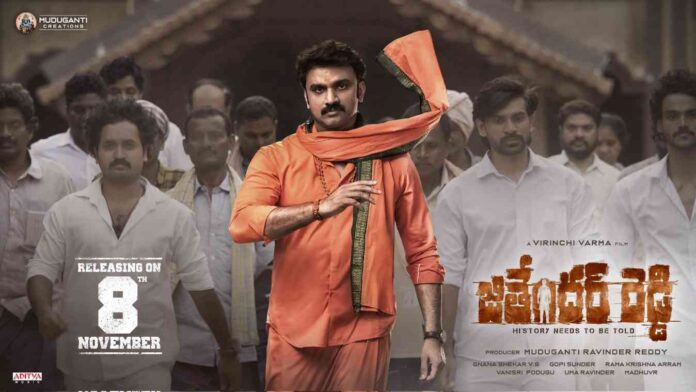Release Date: 8th November 2024
Rating: 3.5/5
Cast: Rakesh Varre, Subbaraju, Riya Suman, Vaishali Raj, Rama Rao Jadhav, Ravi Prakash, Kethiri Sudhakar Reddy, Chatrapathi Sekhar, Rhea Suman and others.
Director: Virinchi Varma
Producer: Muduganti Ravinder Reddy
Banner: Muduganti Creations
Music Director: Gopi Sundar
Editor: Ramakrishna Arram

Storyline:
This film is based on a true story that took place in the Jagityal region of erstwhile Andhra Pradesh. The film revolves around real events that occurred during a time when Naxalism had a strong influence across Telangana. Naxalites, during that era, were often seen as protectors of the people, providing support to those who suffered under oppressive landlords and government policies. However, some Naxalites, driven by personal gain, would go to any extent, even exploiting innocent people.
Against this backdrop, Jithender Reddy (played by Rakesh Varre), who rises as an ABVP leader, becomes a strong supporter of the people in his region. From a young age, Jitender resolves to fight against Naxalism. What factors deeply influenced Jitender to take this stand? How did the government at the time deal with the growing influence of Naxalism? What steps did Jitender take to confront these challenges? To uncover the answers, one must watch the film on the big screen.
Performances:
In the role of Jithender Reddy (Rakesh Varre) known for his work in Baahubali, delivers a commendable performance. Since the character is based on a real person, those familiar with Jithender Reddy can easily identify any inaccuracies, but Rakesh seamlessly fits into the role. From his mannerisms to his body language and dialogue delivery, he took great care in portraying the character authentically. His performance leaves no room for criticism, as he showcases his acting prowess in his own unique style.
Other pivotal roles, such as those played by Subbaraju, Ravi Prakash, and Chatrapathi Shekhar, add depth to the film with their experience. Supporting actors like Vaishali Raj and Riya Suman also deliver justice to their roles, contributing to the overall impact of the movie.
Technical Team:
A special mention goes to the art department, as the film is set in the 1980s, and great care was taken in recreating the era through the sets, costumes, and attention to detail in every aspect. The authenticity is reflected in every frame. The cinematography elevated the film to another level, particularly enhancing the richness of the visuals. However, the editing could have been sharper, as a tighter cut would have benefited the pacing. The background score played a crucial role in heightening the film’s emotions, and some of the songs added an interesting dynamic to the viewing experience.
Analysis:
Though the story focuses on an ABVP leader, it doesn’t solely cater to an audience with those ideological leanings. The film presents the social and political landscape of the time, discussing topics such as the rise of Naxalism, ABVP, and other movements in an engaging and thoughtful manner. The director successfully portrays how Naxalites, fearing that educated villagers would diminish their influence, resorted to extreme measures. The film poses thought-provoking questions through impactful dialogues: “Is development achieved by burning buses or by bringing them to the village? Is breaking roads a sign of progress or laying new ones? Is stirring hatred development, or is unity development?”
While the audience might already know the climax of Jithender Reddy’s journey, the film delves into why he joined ABVP and what sparked his patriotic sentiments. The director effectively presents these elements in a gripping and relatable manner. Despite previously working on love stories, Virinchi Varma impresses with his unique storytelling style in this film.




















